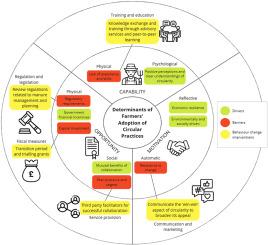“It's ‘common-sense’ farming”: Exploring farmers' decision-making and behaviours towards adopting circular agricultural practices
IF 5.7
1区 社会学
Q1 GEOGRAPHY
引用次数: 0
Abstract
Adoption of more circular farming systems could offer an important avenue for sustainable agricultural transitions by promoting renewable and recycled resources to reduce the need for external inputs, enhance nutrient cycling and farm profitability, and reduce greenhouse gas emissions. This study explored UK stakeholders' perceptions of circular farming practices through focus groups with 16 agricultural industry experts and policymakers, and 17 semi-structured interviews with farmers already engaged in circular practices. These were analysed using the COM-B (Capability/Opportunity/Motivation-Behaviour) model to understand factors affecting adoption. Farmers perceived circular agriculture as a ‘win-win’ solution offering economic, social and environmental benefits, bridging ‘environmentalist’ and ‘productivist’ priorities. They also recognised the principles of circularity as ‘common-sense’ and aligning with their established knowledge and values, reinforcing their identity as ‘good [food producing] farmers’. However, despite these positive perspectives, there remains a need for interventions to enhance uptake, including targeted communication strategies and knowledge exchange to promote awareness and engagement across the sector. In addition, the implementation of circular practices often necessitates collaboration at various scales, particularly in integrating crop and livestock systems. Intermediary organisations could play a vital role in facilitating these partnerships and overcoming resistance stemming from socio-cultural norms and peer influence. Lastly, government support, including financial incentives, was seen as a critical factor in enabling the transition to circular practices and could mitigate risks by providing economic stability. Overall circular agriculture presents a promising pathway towards net zero goals by embedding sustainable practices that align with farmers' established values and knowledge.

“这是‘常识’农业”:探索农民在采用循环农业实践方面的决策和行为
采用更多的循环农业系统可以通过促进可再生和循环资源,减少对外部投入的需求,加强养分循环和农场盈利能力,并减少温室气体排放,为可持续农业转型提供重要途径。本研究通过16位农业行业专家和政策制定者的焦点小组,以及17位已经从事循环农业实践的农民的半结构化访谈,探讨了英国利益相关者对循环农业实践的看法。使用COM-B(能力/机会/动机-行为)模型对这些进行了分析,以了解影响采用的因素。农民们认为循环农业是一种“双赢”的解决方案,提供了经济、社会和环境效益,将“环保主义者”和“生产力主义者”的优先事项联系起来。他们还认识到循环原则是“常识”,与他们已有的知识和价值观一致,加强了他们作为“优秀(粮食生产)农民”的身份。然而,尽管有这些积极的观点,仍然需要采取干预措施来加强吸收,包括有针对性的沟通战略和知识交流,以促进整个部门的认识和参与。此外,循环做法的实施往往需要各种规模的合作,特别是在整合作物和牲畜系统方面。中介组织可以在促进这些伙伴关系和克服来自社会文化规范和同伴影响的阻力方面发挥至关重要的作用。最后,包括财政奖励在内的政府支持被视为向循环做法过渡的关键因素,可以通过提供经济稳定来减轻风险。通过融入与农民既定价值观和知识相一致的可持续实践,整体循环农业为实现净零目标提供了一条有希望的途径。
本文章由计算机程序翻译,如有差异,请以英文原文为准。
求助全文
约1分钟内获得全文
求助全文
来源期刊

Journal of Rural Studies
Multiple-
CiteScore
9.80
自引率
9.80%
发文量
286
期刊介绍:
The Journal of Rural Studies publishes research articles relating to such rural issues as society, demography, housing, employment, transport, services, land-use, recreation, agriculture and conservation. The focus is on those areas encompassing extensive land-use, with small-scale and diffuse settlement patterns and communities linked into the surrounding landscape and milieux. Particular emphasis will be given to aspects of planning policy and management. The journal is international and interdisciplinary in scope and content.
 求助内容:
求助内容: 应助结果提醒方式:
应助结果提醒方式:


